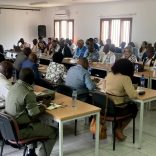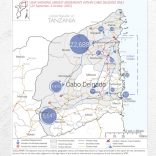Mozambique: Water in Limpopo River is possibly contaminated, warns water board - AIM
Mozambique: Tree used as classroom collapses at school in Maputo province – Watch

Screengrab: :madalenazevo/TikTok
A tree that was used as a classroom at a primary school in Maputo province — a common scenario in Mozambique — collapsed on Thursday without injuring any pupils, the school’s director told Lusa on Sunday (9 November).
“There were no injuries, the tree just fell because it was already very old. It fell, but fortunately it was at the end of the shift and no pupil was caught,” said Fernando Matola, director of the Boquisso Complete Primary School, located in the municipality of Matola, on the outskirts of Maputo.
The incident, which caused alarm in the school community, occurred late on Thursday afternoon.
According to the director of that school, which has just over 7,000 pupils, 31 classes have lessons outdoors, as the school has only 16 classrooms, almost half of which were built during a recent refurbishment.
In May, the Matola municipality announced that the construction of at least 15 new classrooms would begin soon, to mitigate the problem of outdoor classes, in a situation where more than 400 school classes are held in the open.
“We continue to face challenges with outdoor classes; we have recorded a little more than 400 outdoor classes in Matola. It is a very big challenge, which is why we continue to mobilise resources for this issue,” said at the time the president of the Matola municipality, Júlio Parruque.
The President of Mozambique, Daniel Chapo, acknowledged on 13 October, as part of the celebrations for Teachers’ Day, the problem of overcrowded classrooms.
“A youth eager to learn fills our schools. However, this demographic blessing clashes with the reality of classes that in many cases exceed 70 or 80 pupils, when ideally they should not exceed 45,” lamented the Head of State.
To address this situation, he said that the Government “has been investing in the expansion and rehabilitation of the school network” and that in the last five years alone “more than 6,500 new classrooms” have been built.
“It is a remarkable effort, but we know it is still not enough, because new children are born every day. Our commitment is to continue building at least 1,500 new classrooms per year, prioritising the most critical areas. We have already carried out the survey and have the data. Valuing teachers does not end with the payment of salaries. We are aware of that,” said Chapo.












Leave a Reply
Be the First to Comment!
You must be logged in to post a comment.
You must be logged in to post a comment.